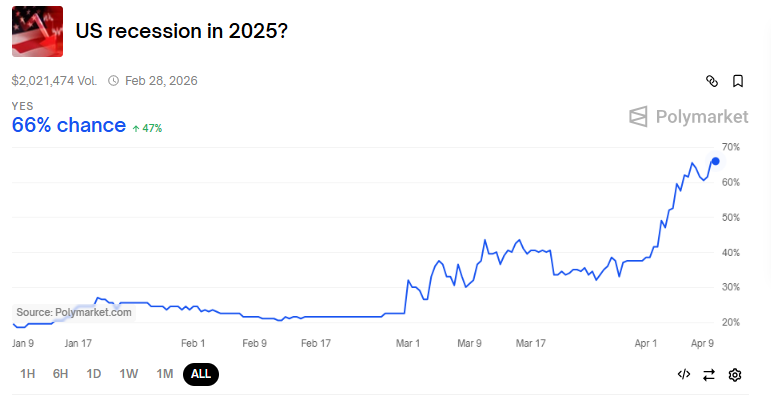Goldman Sachs has raised its chance of a US recession inside the subsequent yr to 45%. The prediction indicators elevated financial uncertainty amid escalating world tensions, tightening monetary situations, and looming tariff impacts.
This marks the best chance of recession predicted by the funding financial institution for the reason that post-pandemic inflation and rate of interest hikes started.
Goldman Sachs Sees 45% Possibilities of US Recession
Goldman Sachs’ newest be aware, “Countdown to Recession,” outlines a pointy deterioration in financial situations. These embody the implications of tariffs anticipated to take impact on April 9.
Steven Rattner, former head of the Obama Auto Activity Power and present Wall Avenue financier, shared the information on social media, emphasizing the gravity of Goldman’s new outlook.
“Goldman Sachs now predicts a 45% chance of a recession in the next year,” Rattner wrote.
In keeping with Rattner, the latest surge in coverage uncertainty and capital spending considerations compound monetary market instability.
In the meantime, Nick Timiraos, the chief economics correspondent for The Wall Avenue Journal, echoed the information, indicating the financial institution has adjusted its 2025 This fall GDP development forecast to a mere 0.5%.
“We are lowering our 2025 Q4/Q4 GDP growth forecast to 0.5% and raising our 12-month recession probability from 35% to 45% following a sharp tightening in financial conditions, foreign consumer boycotts, and a continued spike in policy uncertainty that is likely to depress capital spending by more than we had previously assumed,” Timiraos reported, citing Goldman Sachs.
Whereas this displays the anticipated fallout, the financial institution’s present forecast assumes that many new tariffs scheduled for April 9 won’t materialize.
Nevertheless, Goldman Sachs articulated that if Trump enacted these tariffs, the financial institution would regulate its prediction and formally forecast a recession. This might gasoline already simmering inflation and drive additional downward strain on US financial development.
Amid escalating commerce tensions, Polymarket bettors see nearly 70% odds of US recession after Liberation Day tariffs.

Goldman Sachs Ups Bitcoin ETF Holdings
Regardless of the grim outlook for the economic system, Goldman Sachs stays closely invested within the crypto house, significantly Bitcoin (BTC). As of February 12, the financial institution held a considerable $1.5 billion in Bitcoin. This publicity comes by publicity to BlackRock and Constancy’s Bitcoin ETFs (exchange-traded funds).
Furthermore, latest filings reveal that Goldman Sachs has considerably elevated its Bitcoin ETF holdings. Compared to earlier filings, it boosted its place within the iShares Bitcoin Belief (IBIT) by 88% and the Franklin Bitcoin Belief (FBTC) by 105%.
This place displays Goldman Sachs’ rising curiosity in digital property as a substitute retailer of worth amid conventional market instability.
This enhance comes as Bitcoin has proven resilience in latest months, outpacing many different asset courses in efficiency. Lately, the financial institution’s CEO, David Solomon, highlighted the potential of blockchain know-how to streamline conventional finance (TradFi). BeInCrypto reported Solomon saying Bitcoin was not a risk to the US greenback.
Apart from Goldman Sachs, JPMorgan additionally predicted a recession within the US. BeInCrypto reported that it was the primary main Wall Avenue financial institution to foretell a US recession following former President Trump’s tariffs.
Their forecast warned of the broader financial penalties of commerce wars, predicting that the Federal Reserve (Fed) would possibly want to chop charges prior to anticipated.
The potential for a charge minimize, which many see as a response to a weakening economic system, provides to considerations about stagflation—a simultaneous rise in inflation and stagnation in financial development.
This financial uncertainty additionally raises the percentages of quantitative easing (QE) within the US monetary system. Such an consequence may have far-reaching implications for the crypto market.
If the Fed opts for stealth QE, it may inject liquidity into the market and supply a short-term lifeline for danger property like Bitcoin.
Nevertheless, such actions may additionally intensify inflationary pressures, prompting a troublesome balancing act for policymakers.
Disclaimer
In adherence to the Belief Challenge pointers, BeInCrypto is dedicated to unbiased, clear reporting. This information article goals to supply correct, well timed info. Nevertheless, readers are suggested to confirm information independently and seek the advice of with an expert earlier than making any selections based mostly on this content material. Please be aware that our Phrases and Situations, Privateness Coverage, and Disclaimers have been up to date.


